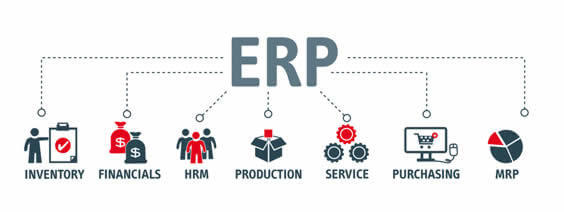Business and enterprise systems are not always tied together in the most efficient way, creating walls inside an enterprise – limiting knowledge sharing and causing all manner of problems. Whether it’s for the factory floor, logistics operations or medical staff, software will be key to getting things done. Yet operating these systems as discreet entities restricts an organisation. Keep reading to discover why ERP is the solution.
What Exactly is ERP?
Enterprise Resource Planning, or ERP, entails tying together disparate systems into one, central software package. ERP software, therefore, integrates discreet business processes and systems into one central core, utilizing a single database that streamlines information sharing.
While ERP is a single system, good ERP software solutions will still capably serve the needs of individual departments such as accounting, marketing, and production. However, by utilizing an ERP system a business can make smarter decisions, offer improved service levels to customers and compete better against its peers.
The Benefits of ERP
Any operation with scale can benefit from ERP, whether it is a government organisation or a medium or large-size business. The benefits of integrating enterprise systems are numerous, including:
- Efficiency and cost savings: Using an ERP system reduces the need to repeat actions or to manually enter information. ERP-driven information sharing means inter-company departments all have access to the same information. ERP also allows operations to draw more insight out of operational data, reducing wastage and highlighting room for improvement.
- Top-down business insight: In large organisations, management can easily be disconnected from day to day operations. ERP software can tie together disparate data sources to deliver up-to-the-minute views of organisational performance, providing high levels of visibility via statistics and graphs and enabling management to step in faster. ERP also improves forecasting by letting management make deeper conclusions from a wider data set.
- Customer service: It is common for customers to get frustrated when one department does not communicate with another. ERP can prevent this from happening while providing a smoother customer experience overall. ERP can also make it easier to comply with laws and regulations, including GDPR and laws governing financial institutions. An informed enterprise is a more compliant enterprise.
Implementing ERP: Best Practices
A system is only as good as its implementation, and so it is with ERP software. Getting your ERP implementation right is crucial to tapping the most out of ERP software. But which aspects of an ERP implementation are the most important to get right?
- Implementing an ERP system is a long process. Include priorities and milestones throughout the project so that stakeholders can enjoy quick wins while ensuring that the most business-crucial tasks are taken care of first.
- Ensure that all stakeholders are on board: switching software packages and changing operating practices requires effort. Staff, management and customers must all understand that the initial effort will be worth the outcome.
- Decide on metrics that will help your organisation evaluate how effective an ERP system is. The complexity of enterprise system does not lend itself to casual evaluation and ERP systems are particularly large investments. Metrics can help correct the course before it is too late.
- Always ensure the entire ERP process is fully documented, starting with initial requirements. Understanding what needs to be done is essential for making progress. Besides, just like metrics, documentary evidence helps your organisation evaluate the progress of an ERP implementation.
- The world of ERP software is wide and varied and your enterprise should think carefully before choosing a vendor. Indeed, avoid choosing a vendor that does not have specialised knowledge of enterprises that operate in your field. Only a deep understanding of your industry can ensure effective implementation.
- Make a qualified judgement between on-premise vs. cloud-hosted ERP systems. Yes, cloud-hosted ERP software can be cost effective and present a very attractive package. Yet for some organisations intimate systems integration is more important and a hybrid or on-premise ERP package may prove more beneficial.
Where to Start With ERP
ERP can be a huge step forward If your enterprise has never taken an organisation-wide approach to software systems. Enrol an experienced ERP partner such as Altivate that can guide you through the processing of ERP design, implementation and evaluation. A well-implemented ERP solution can be truly transformative and it all starts with an initial consultative step.

